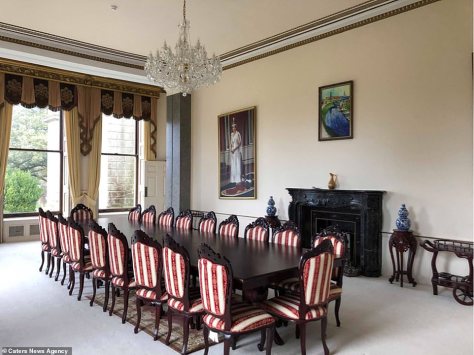One of Suffolk’s finest country houses is facing an uncertain future. It shows no signs of reopening as a hotel, and appears to be falling into disrepair.

In his book ‘In Search of the Perfect House,’ architectural historian Marcus Binney suggests that “in almost every other European country, Shrubland Hall would be called a palace. A grand Italianate composition with belvedere tower, breathtaking terraced gardens, Swiss cottage and five drives.”
Some of our finest architects were associated with Shrubland Hall (or Shrubland Park), making it hard to accept that the mansion has stood empty for nearly four years. In 2015, an ill-fated attempt to use the country house as a luxury hotel ended in failure. Since then, Shrubland has been left to ruminate its past glories.

Shrubland Hall was built in the 1770s by James Paine (1717-89) for the Reverend John Bacon. At the same time, Paine was commissioned to remodel Moor Park in Surrey for John Bacon’s younger brother, Basil, who had inherited the estate in 1770. The third brother, the Reverend Nicholas Bacon, almost certainly used the architect as well, rebuilding the vicarage at Coddenham (now Coddenham House) in 1771.

John Bacon died in 1788, Shrubland passing to his brother, Nicholas, who immediately sold the estate to Sir William Fowle Middleton (1748-1829), 1st Baronet, of Crowfield. Born in Charleston, South Carolina, where his family owned Middleton Place, he arrived in Suffolk after inheriting Crowfield Hall near Stowmarket. His brother, Henry, gave him £30,000 to spend on improvements at Shrubland, and he employed Humphry Repton to expand the park from 1789 onwards, and replaced Paine wings in about 1808.

Shrubland Hall was inherited by his only son, Sir William Fowle Middleton (1784-1860), 2nd Baronet, who brought in architect John Peter Gandy Deering in 1831-38, and later Alexander Roos between 1838-45, who enlarged and redecorated the house. About 1850, he turned to Sir Charles Barry who turned the property into an Italian palazzo.

After his death, Sir William’s cousin, Sir George Nathaniel Broke Middleton, took over. In 1882, it passed to his niece, Jane Anne Broke, and her husband, James St. Vincent (1843-1937), 4th Baron de Saumarez, in the Island of Guernsey, and leased to tenants, including Lord Magheramorne.
During World War One it was one of the first country mansions to be turned into a Red Cross Convalescent Hospital.


In 1965, James Victor Broke Saumarez (1924-1991), 6th Baron, opened the house as a health clinic, leaving the family furniture and valuable collections in place. It was the brainchild of Lady de Saumarez, a former Royal Ballet dancer who married into the family and supervised its running. With an emphasis on detox and weight loss, the hall remained unchanged for forty years, and attracted high-profile guests, including actress Joan Collins. When the clinic closed in 2006, the contents were sold, and the house eventually put on the market by Eric Douglas Saumarez (born 1956), 7th Baron de Saumarez, to cover an inheritance tax bill.



In 2009, the Shrubland estate was sold in 42 lots, the house being bought for £6 million by Dr Muhammad Farmer, Chief Executive and founder of the British Institute of Technology and E-Commerce, which used it as residential accommodation.
Shrubland Hall was far too grand. Farmer’s decision to convert the mansion into an extravagant hotel in 2014 should have been a rewarding undertaking, taking “prestigious guests … on a journey back to the future,” but the Shrubland Royale Hotel suffered scathing reviews, quickly closing in 2015.

Mr Farmer claimed that a “celebrity guest” had booked the entire hotel until the following year. However, by September 2016, signs outside the hall had been removed, the gates were closed and booking attempts were declined. It went on the market for £6.5 million, but remains unsold despite recent claims from Mr Hubbard that the Hilton hotel franchise were interested in taking over the property. A claim later denied by the hotel operator.
The East Anglian Daily Times visited the Shrubland Park Walk – a public right of way that passes through the grounds – in 2017. “The hall appeared an unlikely retreat for any film or music star. The only sign of activity was an older man chopping wood with a chainsaw. Many of the outbuildings appeared in disrepair and the vast grounds left overgrown.”


Meanwhile, Shrubland Hall deteriorates and following complaints from the parish council, Historic England has visited the house to assess the condition of the gardens and the Grade I listed mansion. The park has been on its Heritage at Risk Register for several years.


